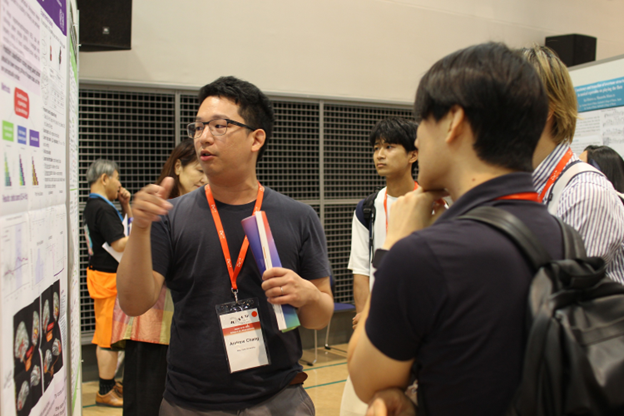Lost in Translation: The Underrecognized Challenges of Non-Native Postdocs in the English Scientific Wonderland
Scientific communication has transcended borders, yet scientists often encounter significant language barriers.
By Andrew Chang

Scientific communication has transcended borders, yet scientists often encounter significant language barriers.
English, hailed as the universal standard language of science, grants a significant advantage to native speakers. For non-native scientists, bridging this gap requires extensive preparation, and this journey can be isolating and anxiety-inducing, particularly for early-career postdoctoral researchers.
As a Taiwanese, Mandarin was my sole mode of communication until I embarked on my Ph.D. journey in Canada. While I was in Taiwan, English had only served as a tool for test-taking and reading imported textbooks.
My first semester in Canada proved to be an all-encompassing experience. Beyond adapting to English-based coursework, acclimatizing to the rapid and colloquial conversations of my peers presented a considerable hurdle. I had to familiarize myself with the natural flow of conversations, replete with slang and cultural references I had never encountered in a classroom in Taiwan.
Moreover, I lacked common ground with most Canadians/Americans, as I wasn’t familiar with their childhood pop culture, trivial facts, or internet memes. Despite being known for my sense of humor among my peers in Taiwan, I felt rather dull, unable to communicate beyond the realm of my science.
A Journey of Improved English Proficency
I vividly recall one evening when I was with fellow new graduate students. We were playing a party board game, and we drew a card that required my teammate and me to chat non-stop for a minute. Everyone anticipated the challenge it posed to me. I wore a reassuring smile, unwilling to disrupt the jovial atmosphere.
However, when the timer began, my partner launched into a rapid, uninterrupted monologue, denying me the opportunity to contribute. Although I knew she did it out of kindness to spare me embarrassment, I couldn’t help but feel frustrated and excluded. It seemed that overcoming the language barrier was an insurmountable expectation, and perhaps people would never recognize my talent or charisma because I couldn’t adequately express myself in a foreign language.
Over the past decade, my English proficiency has significantly improved since the start of my Ph.D. I’ve also assimilated Canadian/American social norms, enabling me to engage with my peers while maintaining my individuality.
Now, tools like ChatGPT make proofreading and editing, including this very article, much more manageable. However, while I can attain good results to a certain extent, the process remains time-consuming and mentally taxing. It can even lead to anxiety: If I fail to make a lasting impression within the first 30 seconds on someone I meet at a conference, particularly a leading scientist in my field, using highly fluent language to express my ideas, I risk losing their interest and potentially missing out on valuable career opportunities.
Diving into the Research
It wasn’t until recently that I stumbled upon a study surveying over 900 scientists, which revealed that many early-career non-native English-speaking scientists encounter similar obstacles. Non-native speakers spend approximately 91% more time reading a paper, 51% more time writing a paper, are 2.6 times more likely to face language-related rejection, encounter 12.5 times more language-related revisions, and invest 94% more time in preparing and practicing presentations.
Also, unfortunately, it appears that overcoming language barriers has largely been left to the efforts of non-native English speakers (Amano et al., 2023). These statistics, based on academia, likely underestimate the extent of the challenges, as many promising scientists may have already abandoned their research pursuits due to language-related frustration (Ortega, 2020).
One might argue that language barriers should not be considered excuses since individuals willingly choose to pursue scientific careers in the United States. However, the reality is that when one opts to become a scientist, they inevitably commit to English as their primary professional language throughout their career.
Given the United States’ predominant position across various scientific disciplines and the fact that all top-tier scientific journals, including Science and Nature, are published exclusively in English, achieving a successful scientific career within the current academic landscape without proficiency in English is an extremely daunting, if not impossible, task. (Note: Perhaps the sole exception is Nobel laureate Tu Youyou.) Scientific findings published in non-English journals are often, if not always, overlooked (Amano et al., 2016).
Indeed, choosing to pursue a postdoctoral position in a foreign country is a deliberate decision, driven by the belief that it will benefit our careers. This choice entails willingly embracing the additional challenges of overcoming not only language barriers but also navigating various other obstacles, including cultural differences (where I’m expected to network in an American way, likely with plenty of socializing over drinks), geographical distances from family and friends (with round-trip flights between New York and Taipei consistently exceeding $2,000, and a 12-hour time difference), dealing with laws, costs, and bureaucracy for obtaining and maintaining a visa and adapting to different daily routines (such as handling taxes, accessing healthcare, and obtaining a driver’s license). However, as international scientists make greater sacrifices, the tolerance for failure diminishes, and it can evolve into unbearable stress.
Creating a Welcoming Environment for Non-Native Speakers
It is imperative for academia to recognize and address this issue to ensure that scientific progress remains unbiased and uninhibited by language barriers. Losing potential talent and dedicated international scientists due to these barriers is not only a disservice to individuals but also compromises the quality of scientific inquiry, potentially introducing biases rooted in the linguistic and cultural backgrounds of scientists.
Consider my research field of cognitive neuroscience of audition, which explores how the human brain perceives speech and music. Without contributions from international scientists, understanding the universal and culturally specific mechanisms underlying these perceptions would be severely limited and biased.
I extend my heartfelt appreciation to all my colleagues who have valued my contributions as a scientist and treated me equally, regardless of my occasionally peculiar English phrasing and my penchant for using amusing words. My hope is that other international scientists, especially those in the early stages of their careers, receive the support they need as they diligently work to overcome their barriers.
Ultimately, I aspire to witness a future in which language differences evolve from barriers into diverse perspectives that benefit the scientific community as a whole.
References
- Amano T, et al. (2016). Languages are still a major barrier to global science. PLOS Biology, 14(12), e2000933. https://doi.org/10.1371/journal.pbio.2000933
- Amano T, et al. (2023). The manifold costs of being a non-native English speaker in science. PLOS Biology 21(7): e3002184. https://doi.org/10.1371/journal.pbio.3002184
- Henrich J, et al. (2010). Most people are not WEIRD. Nature, 466(7302), 29-29. https://doi.org/10.1038/466029a
- Ortega RP. (2020). Science’s English dominance hinders diversity—but the community can work toward change. Science. https://doi.org/10.1126/science.caredit.abf4697
Andrew Chang, PhD ,is a 2023 Leon Levy Scholar in Neuroscience.
This piece was originally published on the National Postdoctoral Association member blog as part of 2023 National Postdoc Appreciation Week. Current Academy Members can receive a 20% discount on a National Postdoctoral Association postdoc individual membership by emailing customerservice@nyas.org and requesting the NPA membership discount code
